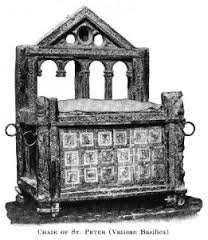Britain is voting as I write on whether or not to stay within the ‘European Union’, with pundits widely divided on the effects of departure, on Britain, Europe and the world. Financial disaster, riots in the street, or improved stability and increased national fervour
When questions like this arise, it is wise to go first to the essence, the nub, of the question: What is the proper way for a nation to be governed, and, particularly in this case, what level of autonomy should a nation have? Should there be a supra-national government, that can trump properly elected parliaments, whether this be the United Nations or the European Parliament?
There is nothing intrinsically wrong with a united Europe, which was, to a greater or lesser degree, ‘one’ in the Roman Empire in its various manifestations, holy, Catholic and otherwise. The rise of nationalism in the wake of the Empire’s gradual dissolution, which was made manifest with the loss of the unity provided by the Catholic Church after the rise of Protestantism, had good and bad effects, depending upon one’s historical focus and point of view. I would go mostly with the bad, beginning with the wars of religion, the Thirty Years War, and all the wars and internecine strife since.
There is nothing wrong, and much that is good, with greater unity, and in fact it is something for which we should all strive, but only if such unity is founded upon the truth. Being ‘united’ in evil is oxymoronic, for evil can never truly unite, and a house divided against itself is sure to fall.
That is the problem with the European Union, a constructed entity with a long and convoluted history, culminating in the Maastricht Treaty of 1992, imposing a unity upon the 28 member states, which widely diverge in terms of their economies, their forms of government, their culture, their religion, their outlook, their aims, their needs. It is a quixotic adventure, fraught from the beginning with tensions and the seeds of its own dissolution: How does one govern half a billion people over nearly 1.5 million square miles, from a central office in Brussels?
Even at a purely practical level, as other have written in great detail, how does one impose a unified currency, the infamous ‘Euro’, on countries with as widely divergent economies as Greece and Germany? Left to their own, the drachma and the deutschmark are nowhere near parity, so the Germans support the Greeks, to the latter’s shame and resentment, and the former’s condescension and, now, frustration.
One cannot unite people artificially, for unity can only be founded upon truth, and the deeper the truth, the greater the unity. That is why religious unity, what binds people in the most foundational of our realities, is the greatest unity. The relative permanence and stability of the Holy Roman Empire was due to the people of Europe being united in the Faith, whatever their other divisions. As Belloc wrote, Europe is the Faith, and the Faith is Europe.
Well, Europe has more or less lost its faith, and is now trying to find unity in modern ‘European values’, many of which are banal, some downright evil, like the universal right to abortion, while others are facing real stress, like welcoming refugees and other immigrants. But Europe cannot handle the refugees it currently has, never mind the thousands, even millions, waiting to come across the Mediterranean and isthmus of near Asia.
Many Britons innately get this, at least at an emotive levle, and will no longer tolerate being dictated to by a group of bureaucrats in Brussels. In some inchoate way in their uneducated milieu, they seek a greatness Britain once had, but has no longer. They want to cast off on their own, as the brave island nation that once ruled over an empire upon which, in Queen Victoria’s famous phrase, the Sun never set.
Alas, that Britain is long gone, rolling down the bloodied scaffold with the heads of Thomas More and John Fisher. It is now a land of semi-educated yobbos, with the ‘educated’ and rich ensconced in gated compounds. The churches are empty, and what culture remains is crumbling. How long can ‘football’, which we know as ‘soccer’, hold a people together?
In the end, alas, Europe, and Britain along with her, is on a death-spiral, as even a passing familiarity with demography will convince the reader. The birthrate is nowhere near replacement level, and falling. The only ones having enough children to hand on their culture (and it requires a ‘culture’ to have children) are the Muslims (along, one may surmise, with a few Catholic outliers here and there).
The vote today, whichever way it goes, will give Britons some sense of victory, but it will be short-lived, unless they once again discover the Faith that made them great, and a unity founded upon the truth.












